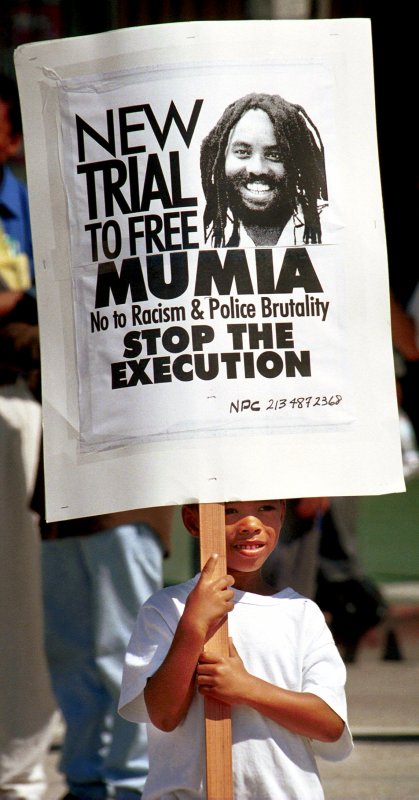A young demonstrator participates in a rally at Leimart Park in Los Angeles September 25, 1999, where people gathered to demand a stop to Mumia Abu-Jamal's execution and to push for a new trial for him. Abu-Jamal was convicted of killing a Philadephia police officer in 1982 and is on death row awaiting an execution date. He claims he was framed by authorities. jr/Jim Ruymen/UPI |
License Photo
PHILADELPHIA, April 26 (UPI) -- The jury that sentenced Mumia Abu-Jamal to death for the murder of a Philadelphia police officer was wrongly instructed, a U.S. appeals court said Tuesday.
The court ordered the state of Pennsylvania to hold a new sentencing hearing within 180 days or to sentence Abu-Jamal to life imprisonment. The three-judge panel upheld the findings of a district court judge and an appellate decision in 2008.
Abu-Jamal, 57, has been on death row since 1982 when he was convicted of shooting Police Officer Daniel Faulkner. During his years in prison, he has written several books and become one of the best-known death-sentenced inmates in the world.
Philadelphia District Attorney Seth Williams said he is considering whether to appeal to the U.S. Supreme Court, The Philadelphia Inquirer reported. The high court has already ordered the appeals court to reconsider its earlier finding that the sentence was invalid, resulting in Tuesday's opinion.
The court found the judge gave confusing instructions to the jury. As a result, the panel found, jurors might have believed wrongly that they needed to be unanimous on mitigating factors.
Abu-Jamal, a former Black Panther, worked for several public and commercial radio stations in Philadelphia during the 1970s. At the time of his arrest, he was driving a cab.















